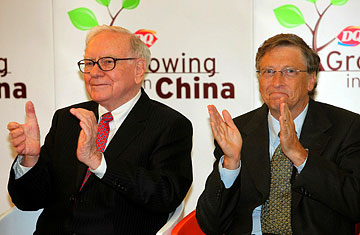
Warren E. Buffett, left, and Bill Gates, right, attend the opening ceremony of a new branch of Dairy Queen in Beijing on Sept. 30, 2010
Shortly before an exclusive event promoting charity was to take place in late September, tension was running high in the local Chinese media. Rumors had been floating around for weeks that half of the 50 or so billionaires invited to the dinner, known as the "Ba-Bi" banquet, might not show up. The Chinese term "Ba-Bi" refers to Warren Buffett and Bill Gates, the two hosts of the much-hyped dinner event.
In the end, the press's hand-wringing was for naught: More than two out of three invitees attended, the two Americans proudly announced at a subsequent press conference in Beijing that they found philanthropy among the country's ultra-rich to be alive and well. According to Rupert Hoogewerf, publisher of an influential Chinese rich list, China currently has 189 dollar billionaires, second in number only to the U.S. "All those people have made enough money for generations to come," says Hoogewerf. "Now is a good time to start thinking about giving."
But for most Chinese people, the idea of charity seems a bit detached from daily life. Although total amount donated, according to the government, has risen from $1.5 billion (10 billion rmb) in 2006 to over $7.5 billion (50 billion rmb) last year, it's a negligible fraction of the $300 billion annually donated in the U.S. — over 2% of the country's GDP. With the exception of 2008, when the disastrous Sichuan earthquake bumped up China's donations to an unprecedented $15 billion (100 billion rmb), "the awareness for philanthropy is still relatively low," says Deng Guosheng, director of Innovation and Social Responsibility Research Center at Tsinghua University. Typically, only around 20% of China's annual donations come from individuals; the rest are made by private enterprises. In the U.S., that number is closer to 70%.
Deng says China's breakneck economic growth has fostered widespread materialism in recent years, a trend intrinsically contrary to the notion of philanthropy. In 2009, China alone accounted for 25% of the world's total luxury consumption, making it the second largest luxury market after Japan, whose GDP per capita is more than 10 times higher. Despite their consumerism, the Japanese still appear more charitable in general than the Chinese. According to the 2010 World Giving Index, released by the Charities Aid foundation, 17% of the Japanese population has made charitable donations, compared to China's 11%.
Historically, China's culture of giving can be traced back to Confucian preachings of benevolence as well as to Taoist and Buddhist principles, but all of them subsided as war and political turmoil dominated the country's more recent history. Today, even for China's nouveau riche who are willing to give, government policies often fail to encourage charitable actions. Tsinghua's Deng said that although there is officially a national tax deduction policy for charity donations, local governments often try to negate that in their own interest. Moreover, the policy only applies to donations made to the very few government-sanctioned charities, which are commonly blamed for lack of transparency or even corruption.
"If my donation doesn't end up helping the needy, to me it's not a question of money," Cao Dewang, CEO of Fuyao Group, the biggest glass manufacturer in China, said in a recent interview with the state-run China Central Television. "I'd feel cheated." According to the CCTV, Cao pledged to donate $30 million (200 million rmb) to 100,000 low-income households via the China Foundation for Poverty Alleviation, a non-profit charity overseen by the government — but only after signing a detailed contract to ensure that his money falls into the right hands.
Meanwhile, many smaller, grassroots NGOs are faced with the eternal conundrum of maintaining independence while coping with the Chinese government. Per Chinese law, private foundations are forbidden to independently accept and distribute donations, a situation that largely restricts their role and diminishes reputation. What's worse is that for those NGOs, gaining official ratifications — and therefore being able to operate independently — is practically impossible, largely because those who are in charge are not incentivized to do so.
"I think the obstacles [to developing philanthropy in China] are similar to what everybody sees in the U.S., which is you want to make sure your gift can have the impact," Bill Gates said at the press conference last month. "Because the wealth here is so new... the notion of what is the role of the government versus philanthropy is still being developed."
